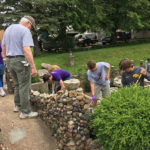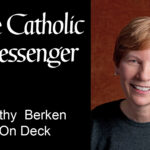
St. Ambrose University professor Micah Kiel stands on a road in Ephesus, Turkey, during a recent sabbatical. His visits to sites where early Christians gathered provided insights for his talk on the Eucharist Jan. 22 at diocesan headquarters in Davenport.
By Barb Arland-Fye
The Catholic Messenger
DAVENPORT — Scripture offers insights about the Eucharist and its call to solidarity for those who partake in the sacrament, even though the word “Eucharist,” as it is used today does not appear in the Bible. St. Ambrose University theologian Micah Kiel explored the scriptural insights during a presentation Jan. 22 for the fourth annual Sunday of the Word of God and the Eucharistic Revival underway in the United States.
Kiel used a “nuggets” and “nudges” approach to his presentation, with nuggets as “interesting details/factoids about Scripture and the Eucharist” and nudges as a “deeper dive into how Scripture can inform our understanding and living of the Eucharist today.”
His recent sabbatical to Turkey and Greece provided a visual framework for the presentation. “The archeological pictures and illustrations from Ephesus, and the explanations of how the early Christians met not just in homes, but perhaps in businesses and parks and open spaces … brought the Scriptures to life,” said Paul Alagna of Our Lady of Lourdes Parish in Bettendorf. He was among 50 people who registered to attend the diocesan presentation in person or online.
“Eucharist” first appears as a title for the meal in the “Didache,” an early Church teaching document (c. 100 CE), Kiel said. However, as the Gospels of Matthew, Luke and Mark and Paul’s First Letter to the Corinthians attest, the early Church had been celebrating Eucharist for decades before the New Testament writers began writing about it.
For example, the Emmaus story in Luke’s Gospel seems to model “an early understanding of a liturgy of the word and a liturgy of the Eucharist,” Kiel said. “You can see that structure in the story. This is a perfect example of where you see the liturgy shaping and informing, retrospectively, the stories that we read about Jesus in the New Testament.”
“Home, bakeries and parks,” was the whimsical title of a section of Kiel’s presentation that illustrated the spaces where the early Christians gathered for an agape meal followed by the sacramental meal. Photographs from Kiel’s sabbatical showed the ruins of the homes, the “bakeries” and the parks where the faithful broke bread, places such as Corinth and Ephesus.
Eucharist and solidarity
Divisions, especially related to socioeconomic tension, at times marred these communal celebrations, for which Paul took the faith community to task in 1 Corinthians. Among the verses that Kiel cited were 11:27-34 in which Paul admonishes anyone who eats the bread or drinks the cup of the Lord unworthily. “… For anyone who eats and drinks without discerning the body, eats and drinks judgment on himself. …”
The chapters preceding and following that passage make clear that discerning the body refers to the peoples who make up the body of Christ, Kiel said. “… God has so constructed the body as to give greater honor to a part that is without it, so that there may be no division in the body, but that the parts may have the same concern for one another” (1 Cor. 12:24-25).
“Discerning the body” is about lifting up the weaker members of the body, the non-respectable ones, Kiel said. Paul is suggesting that “everyone is called to think of the other person first and, more than that, to actually clothe them with honor and lift them up. Is that what we’re doing when we partake of the Eucharist? … This is the nudge from Paul, the nudge from Scripture.”
Kiel cited passages from St. John Paul II’s encyclical Sollicitudo Rei Socialis, which speaks to communicants’ call to receive from the Eucharist “the strength to commit ourselves ever more

St. Ambrose University professor Micah Kiel sits on a column in Laodicea, Turkey, during a recent sabbatical.
generously, following the example of Christ, who in this sacrament lays down his life” (No. 38).
… “In the light of faith, solidarity seeks to go beyond itself, to take on the specifically Christian dimensions of total gratuity, forgiveness and reconciliation.… One’s neighbor must therefore be loved, even if an enemy, with the same love which the Lord loves him or her; and for that person’s sake one must be ready for sacrifice, even the ultimate one: to lay down one’s life for the [other]” (No. 40).
“To me, this is what is lacking whenever you watch the news, when you see CNN go one way and you see Fox go the other way and you see our politicians,” Father John Stecher, a retired diocesan priest, said. The solidarity that emanates from the Eucharist “is not going to map onto a political platform,” Kiel responded in agreement. “So many Catholics and Christians have outsourced their hopes for society to one party or the other.”
Insights participants gained
Kiel’s exploration of 1 Corinthians “brought back into the present why we gather for Mass in community,” Alagna said. “This reading is a scolding by St. Paul of the whole community when they gathered for what was an agape meal, where some had food and others may not have had food for the meal.” Paul spoke of “the need to share and provide for all before taking part later in the gathering for the ‘breaking of the bread,’ which we know now as the Eucharist. This is still an issue today, when some have much and others have little or nothing. It still points to the need for solidarity with our fellow Christians in the world, but also in our own community.”
Father Steve Ebel, a retired diocesan priest, said he particularly enjoyed Kiel’s “Scriptural references to God’s actions throughout salvation history to nourish his children. Old Testament examples would be the manna in the desert, and the story of the widow in 1 Kings. The New Testament is also full of such passages with Jesus’ feeding of the 5,000 and the apostles on the road to Emmaus. The Eucharist is in the same vein, but since the Last Supper, Jesus is feeding people with his own body and blood.”
“The historical detail that Micah delivers pieces together the various accounts we read, but may not understand in the Bible,” said Ken Miller of St. John Vianney Parish in Bettendorf. “In Micah’s presentation, he was able to add insight into the movements of the early Church; those stories and letters we have read over and over, but without an understanding of the events that led up to those words we read. Micah has a unique way of bringing all that history alive!”
Barb Kendall, of Sacred Heart Cathedral in Davenport, appreciated Kiel’s insights “regarding God’s preparation of the faithful throughout Old Testament history for the holy Eucharist that is the center of our Christian worship as Catholics. A number of participants asked questions that opened the discussion for further consideration and depth.”











